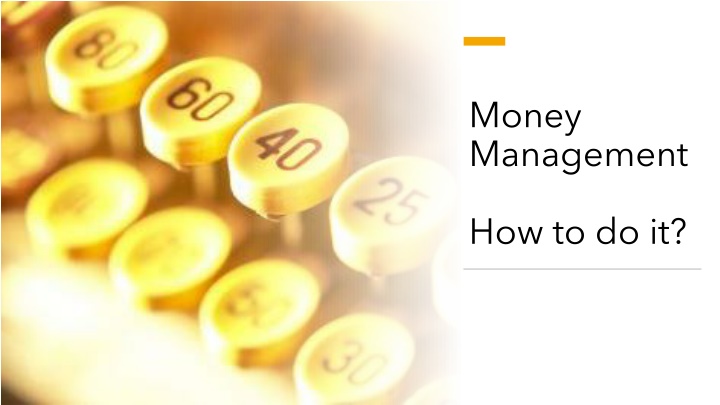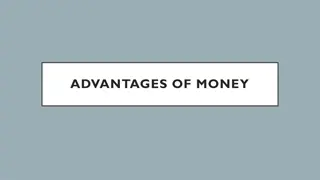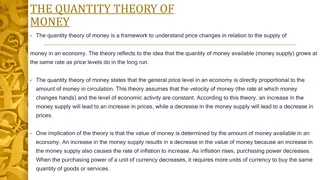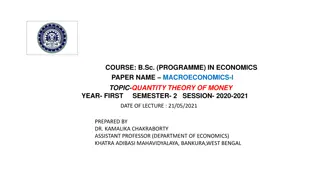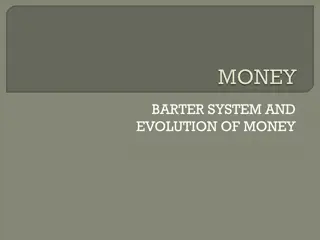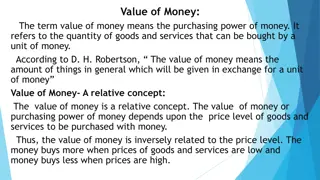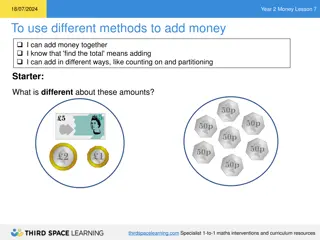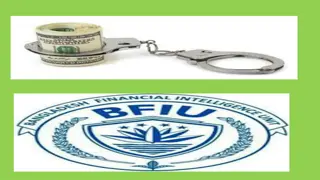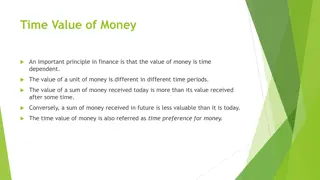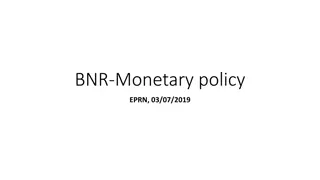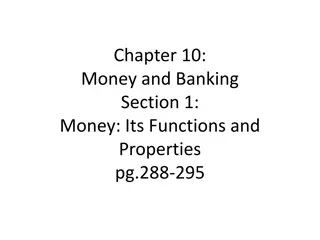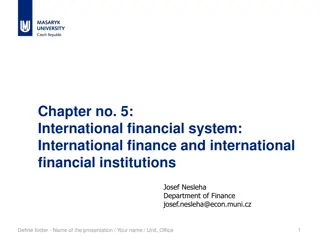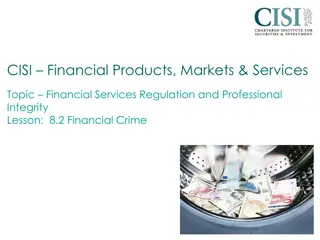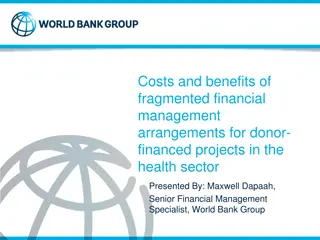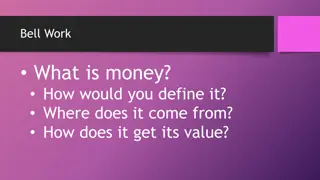Effective Money Management Strategies for Better Financial Health
Understanding your income sources and expenses is crucial for successful money management. By knowing your exact income and tracking your spending across different categories, you can create a realistic budget, ensure financial stability, and make informed decisions based on your financial situation. Learn about income, tax brackets, housing costs, and budget allocation to optimize your financial well-being.
Download Presentation

Please find below an Image/Link to download the presentation.
The content on the website is provided AS IS for your information and personal use only. It may not be sold, licensed, or shared on other websites without obtaining consent from the author.If you encounter any issues during the download, it is possible that the publisher has removed the file from their server.
You are allowed to download the files provided on this website for personal or commercial use, subject to the condition that they are used lawfully. All files are the property of their respective owners.
The content on the website is provided AS IS for your information and personal use only. It may not be sold, licensed, or shared on other websites without obtaining consent from the author.
E N D
Presentation Transcript
Money Management How to do it?
Knowing your income KNOW YOUR INCOMINGS IS JUST AS IMPORTANT AS KNOWING YOUR OUTGOINGS MAKING SURE YOU KNOW THE EXACT AMOUNT YOU GET CONSISTENTLY EACH WEEK/MONTH MEANS YOU CAN BUDGET CORRECTLY FOR THAT WEEK OR MONTH FOR EXAMPLE, IF YOURE SPENDING 1K PER MONTH, BUT ARE ONLY GETTING 900 A MONTH, YOU HAVE A PROBLEM.
Knowing your Outgoings Receipts, categories for spending and budgeting will help you keep a good handle on your money Knowing how much youre spending and where its being spent is important I go for five different categories when I am looking at my budget We all spend more than we think we spend This is ok, it happens to everyone Make sure your budget is reflective of your actual, not ideal spending Keep your receipts in a safe place (such as a tin of denial) You can download all your bank transactions into an Excel spreadsheet for easy organisation Rent Bills (electricity, phone bill, internet) Essentials (food, self care items) Fun money Savings
Income National Minimum Wage If you are working full time (37hrs per week) that means you will earn 23 And over 21-22 1428.57 1340.39 1051.79 18-20 Under 18 Apprentice 740.74 per month 01 April 2021 689.43 Which is 23 And over 21-22 1220 18-20 Under 18 Apprentice 740.74 01 April 2021 1163 1021 689.43 after tax
The average rent for a private 1 bedroom in Exeter is 743 (not inc. bills) Rent The average cost of a private room in a shared house is 527 (usually inc bills) The average cost of a LA 1 bedroom in Exeter is 568 (not inc. bills) Local Council Housing for 1 bedroom ~ 350 (not inc. bills)
Age Income Housing Cost Remaining 23 and over 1220 Private 1 Bedroom 743 477.00 Budget - Rent Shared 1 Bedroom 527 693.00 LA Housing 568 652.00 Council Housing 350 870.00 21-22 1163.00 Private 1 Bedroom 743 420.00 Knowing roughly how much you can afford to spend on rent is very important Shared 1 Bedroom 527 636.00 LA Housing 568 595.00 Council Housing 350 813.00 18-20 1021.00 Private 1 Bedroom 743 278.00 Many places suggest no more than 35% of your income, some 45, some 50% Shared 1 Bedroom 527 494.00 LA Housing 568 453.00 Council Housing 350 671.00 Under 18 740.74 Private 1 Bedroom 743 - 2.26 The percentage doesn t matter, what matters is You can afford it You are safely housed You are happy living there Shared 1 Bedroom 527 213.74 LA Housing 568 172.74 Council Housing 350 390.74 Apprentice 689.43 Private 1 Bedroom 743 - 53.57 Shared 1 Bedroom 527 162.43 LA Housing 568 121.43 Council Housing 350 339.43
Budget - Bills A small 1 to 2 bedroom house will roughly cost (for 1 person) 55 in energy (gas/electric) 40 on water 111 on council tax Other bills might include 25 phone bill 30 internet bill 10 for a property service charge 13 for Netflix 13.25 for TV license 5 contents insurance cost (worth it!) Total Cost of bills: 302.25
Cost of a small 1-2 bedroom house (for 1 person) 55 in energy (gas/electric) 40 on water 111 on council tax Receipts, categories for spending and budgeting will help you keep a good handle on your money Budget - Bills Keep your receipts in a safe place (such as a tin of denial) You can download all your bank transactions into an Excel spreadsheet for easy organisation I go for five different categories when I am looking at my budget Rent Bills (electricity, phone bill, internet) Essentials (food, self care items) Fun money Savings
Essentials are things we cant go without, such as Food Shampoo/conditioner/bodywash Toothbrushes/toothpaste Cleaning products (inc. laundry, washing up etc.) The average person spends 108 per month on food Budget - Essentials Around 10 per month on bodywash and hair care 6 on tooth care Around 15 per month on household cleaning products Total of 139 per month on essentials
Lets say we are 23yrs, living in shared accommodation with bills included Budget Rent/Bills/Essentials Total Income = 1,220.00 Rent - 527 Phone/Netflix/Insurance - 43 Essentials - 139 TOTAL OUTGOINGS = 709.00 TOTAL REMAINING = 511.00
So we have 511 remaining out of our monthly pay Budget Fun Money Fun money includes any expenditures that aren t keeping you alive (shelter, food, warmth, cleanliness, entertainment) So this could be Takeaway food/eating out Non-essential clothing purchases (replacing holey socks is essential!) Holidays Pub/club visits Alcohol, tobacco Gym or other subscriptions Books Plants More expensive hobbies
It is always best to over estimate the amount of money you spend on non-essential items (to be fair anything) If you think you re spending 10 on a night out, you re more likely spending 15 (e.g three drinks for 12, and chips on the way home) Budget Fun Money Everyone spends different amounts on themselves for different things and reasons, so for a month keeping receipts and checking bank statements might give you a good idea of how much you spend on non-essentials each month If you are unsure of how much you have to spend for fun, split the remaining budget in half, one for fun one for savings, and see how much you dip into the savings that month
Budget - Savings Savings should be split into two categories Emergency savings Goal savings Emergency savings are for emergencies only e.g you lose your source of income for a while Many recommendations suggest having a 3-6 month emergency fund for rent, bills and essentials For a 23yr old full time min wage worker living in shared accom. this would be 2,127 for 3 months emergency savings 4,254 for 6 months emergency savings
Goal savings are different due to them usually having a set date for use rather than the possibility of an emergency Budget - Savings Usually goal savings are not permanent, and change over time Goal savings could be A holiday A new pair of expensive shoes or bag Deposit for buying a house New furniture A new vehicle (car, motorbike, pushbike) Something fun, like a skydive or fancy dinner or new camera
Budget Fun vs Savings So if we split our remaining budget in half - 511 we have 256.50 for fun 256.50 for savings Around 8 months to have 3 months of emergency savings Around 1 year and 5 months to have 6 months of emergency savings If we are putting money into our emergency savings only it would take This means that for quite a while we wouldn t be able to save for a goal
Thats a long time to go without a big holiday, so what if we split our remaining money into fun, emergency savings and goal savings Budget Fun vs Savings That would mean 170 for fun 170 for emergency savings 170 for goal savings It would then take Just over a year for 3 months of emergency savings Two years and one month for 6 months of emergency savings BUT you would have a good amount of goal savings
Budgeting is about really looking at your income and expenditure honestly Its not about making big changes to your lifestyle, this almost never works For instance if you want McDonalds, it might cost 6 Budget But you can get a big bag of oven chips, 4 burgers and 4 buns for the same price Now instead of spending 6 on one meal you have spent 1.50 for 4 meals This doesn t mean you should not have McDonalds, but if youre getting a big mac every week, you could have one a month and save yourself at least 18 by making a dupe at home
So if you want to be able to have a bigger budget for savings or fun, you need to look at your income vs expenditure Either your expenditure needs to go down, or your income needs to increase So looking at your bills and shopping around for better deals, share a Netflix account with a friend, don t get the newest phone etc Budget Or look at an increase in income, use your experience and qualifications to negotiate for a higher wage or change jobs for more per hour We can help you with your CV, help you research companies and help you find the legit vs scam jobs out there
